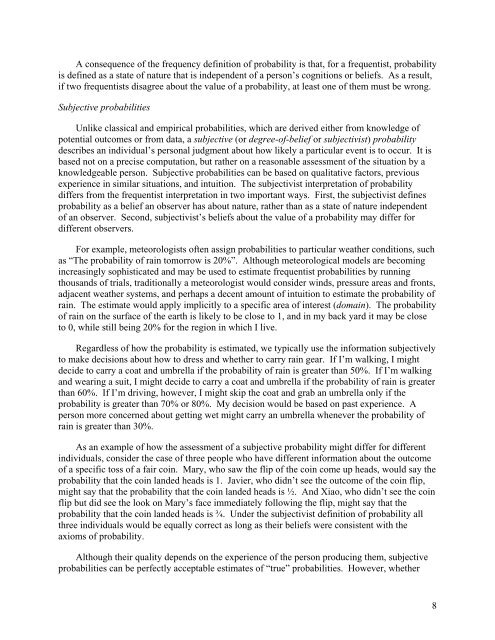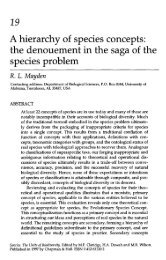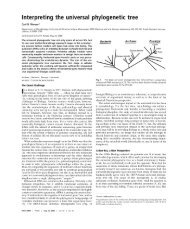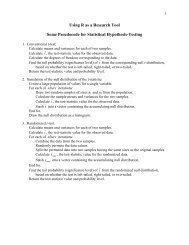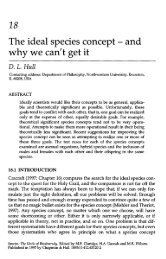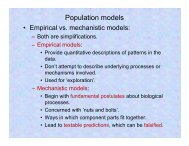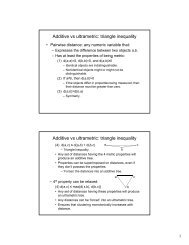3. Basic probability concepts
3. Basic probability concepts
3. Basic probability concepts
You also want an ePaper? Increase the reach of your titles
YUMPU automatically turns print PDFs into web optimized ePapers that Google loves.
A consequence of the frequency definition of <strong>probability</strong> is that, for a frequentist, <strong>probability</strong><br />
is defined as a state of nature that is independent of a person’s cognitions or beliefs. As a result,<br />
if two frequentists disagree about the value of a <strong>probability</strong>, at least one of them must be wrong.<br />
Subjective probabilities<br />
Unlike classical and empirical probabilities, which are derived either from knowledge of<br />
potential outcomes or from data, a subjective (or degree-of-belief or subjectivist) <strong>probability</strong><br />
describes an individual’s personal judgment about how likely a particular event is to occur. It is<br />
based not on a precise computation, but rather on a reasonable assessment of the situation by a<br />
knowledgeable person. Subjective probabilities can be based on qualitative factors, previous<br />
experience in similar situations, and intuition. The subjectivist interpretation of <strong>probability</strong><br />
differs from the frequentist interpretation in two important ways. First, the subjectivist defines<br />
<strong>probability</strong> as a belief an observer has about nature, rather than as a state of nature independent<br />
of an observer. Second, subjectivist’s beliefs about the value of a <strong>probability</strong> may differ for<br />
different observers.<br />
For example, meteorologists often assign probabilities to particular weather conditions, such<br />
as “The <strong>probability</strong> of rain tomorrow is 20%”. Although meteorological models are becoming<br />
increasingly sophisticated and may be used to estimate frequentist probabilities by running<br />
thousands of trials, traditionally a meteorologist would consider winds, pressure areas and fronts,<br />
adjacent weather systems, and perhaps a decent amount of intuition to estimate the <strong>probability</strong> of<br />
rain. The estimate would apply implicitly to a specific area of interest (domain). The <strong>probability</strong><br />
of rain on the surface of the earth is likely to be close to 1, and in my back yard it may be close<br />
to 0, while still being 20% for the region in which I live.<br />
Regardless of how the <strong>probability</strong> is estimated, we typically use the information subjectively<br />
to make decisions about how to dress and whether to carry rain gear. If I’m walking, I might<br />
decide to carry a coat and umbrella if the <strong>probability</strong> of rain is greater than 50%. If I’m walking<br />
and wearing a suit, I might decide to carry a coat and umbrella if the <strong>probability</strong> of rain is greater<br />
than 60%. If I’m driving, however, I might skip the coat and grab an umbrella only if the<br />
<strong>probability</strong> is greater than 70% or 80%. My decision would be based on past experience. A<br />
person more concerned about getting wet might carry an umbrella whenever the <strong>probability</strong> of<br />
rain is greater than 30%.<br />
As an example of how the assessment of a subjective <strong>probability</strong> might differ for different<br />
individuals, consider the case of three people who have different information about the outcome<br />
of a specific toss of a fair coin. Mary, who saw the flip of the coin come up heads, would say the<br />
<strong>probability</strong> that the coin landed heads is 1. Javier, who didn’t see the outcome of the coin flip,<br />
might say that the <strong>probability</strong> that the coin landed heads is ½. And Xiao, who didn’t see the coin<br />
flip but did see the look on Mary’s face immediately following the flip, might say that the<br />
<strong>probability</strong> that the coin landed heads is ¾. Under the subjectivist definition of <strong>probability</strong> all<br />
three individuals would be equally correct as long as their beliefs were consistent with the<br />
axioms of <strong>probability</strong>.<br />
Although their quality depends on the experience of the person producing them, subjective<br />
probabilities can be perfectly acceptable estimates of “true” probabilities. However, whether<br />
8


